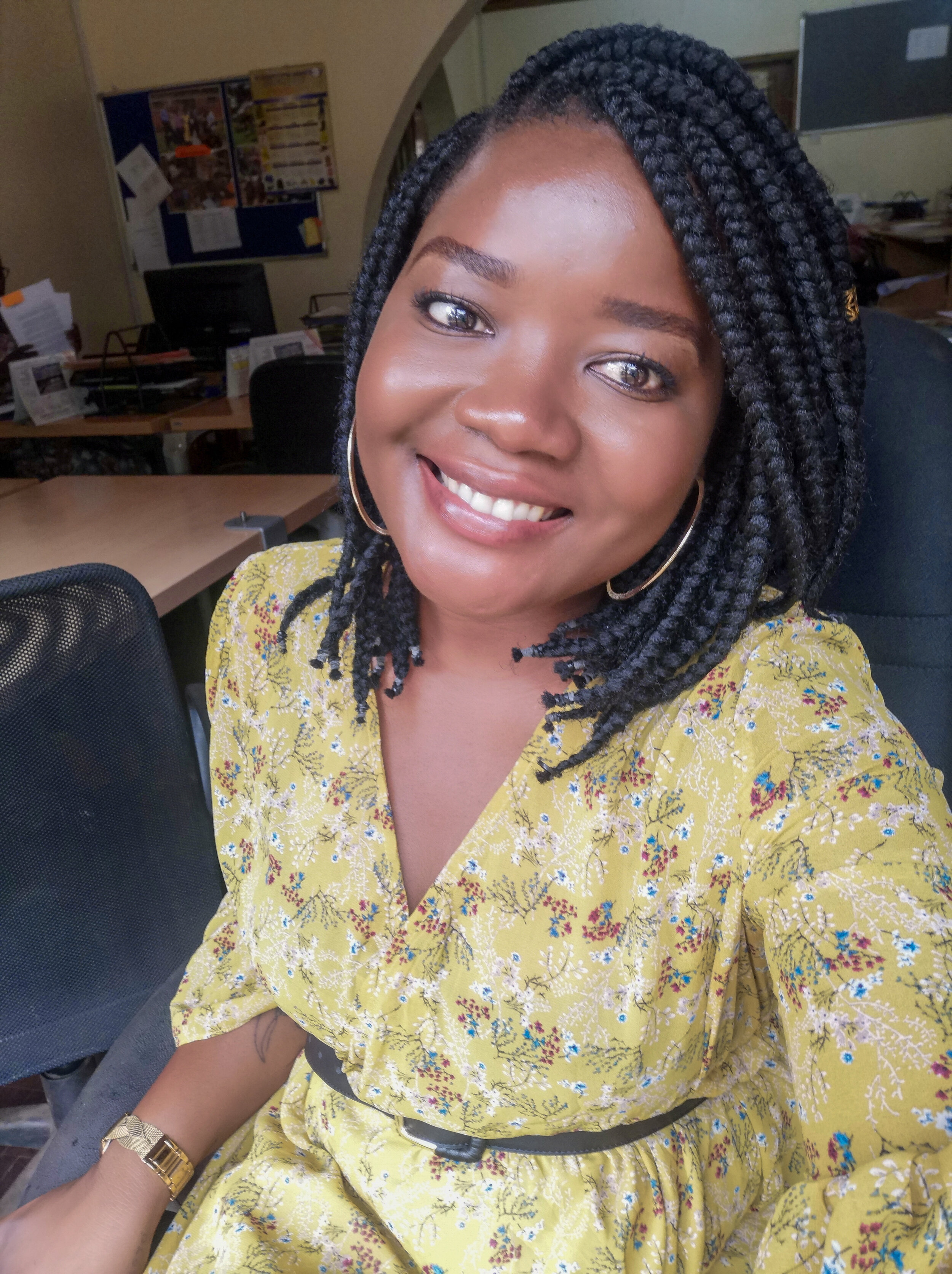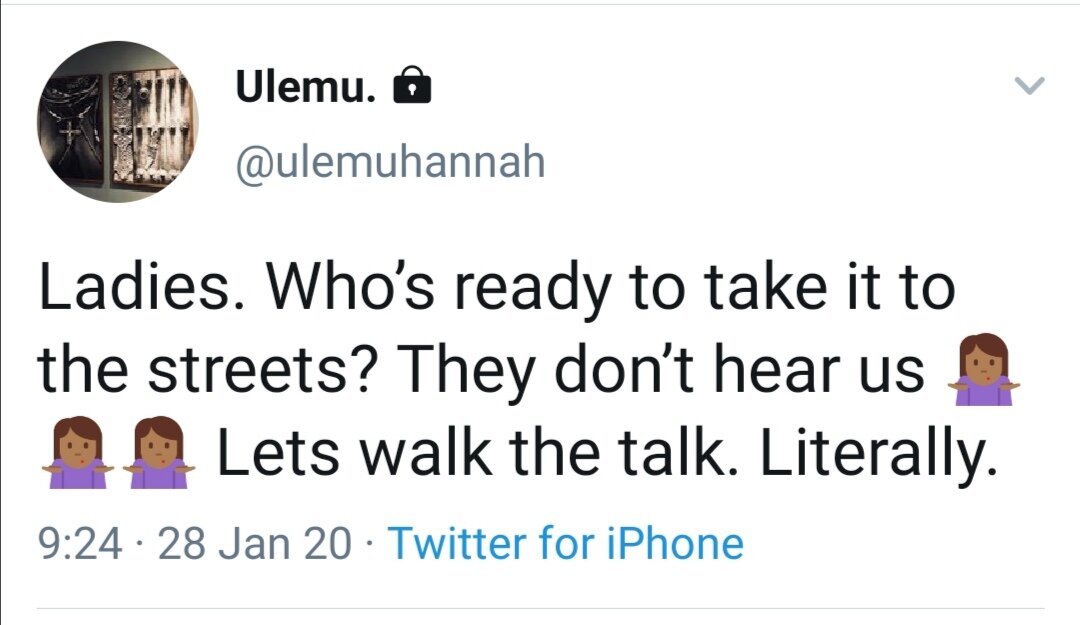Afrifem in action: Umba Zalira (Malawi) tells us about the #TakeItToTheStreetsMalawi protests
/#TakeItToTheStreets protesters in Malawi on 1 February 2020. Photo credit: Thoko Chikondi.
Hello Umba, thank you for being the first guest in Eyala’s Afrifem in Action series! Can you please introduce yourself and your feminist work ?
Thank you for the invitation; I am a big fan of Eyala, so this is a great honor! I am Umba Zalira and I am a sexual and reproductive health and rights (SRHR) activist based in Malawi. I have been working in the advocacy space for the past eight years, with a focus on centering young women’s needs and lived realities in relation to access to SRH information and services.
The context of African women’s lived realities is uniquely entwined with patriarchy and systematic oppression that is heavily influenced by colonialism and neocolonialism, so my work in the advocacy spaces at national, regional and international levels is all about pushing for a feminist perspective in the SRHR field.
In the past years, I have made a conscious decision to focus on mobilizing and movement-building for younger feminists. That intention led me to join PEPETA, a regional platform that mobilizes young women from the SADC region to call for an SRHR agenda that speaks to the issues girls and young women face in the SADC countries. I am currently a steering committee member of PEPETA regional platform and I play an advisory role for the Malawian national chapter.
What fuels your feminist work?
My work is hinged on my own personal story as a young Malawian woman and also the stories of my mother, grandmother, sisters and my community at large.
Meet Umba Zalira from Malawi. (How does one even do photo credits for a selfie?!)
Tell me about #TakeItToTheStreetsMalawi. How did things start?
#TakeItToTheStreetsMalawi is a new yet powerful initiative born out of the collection of anger and power from young and older women in Malawi. It all started a couple of weeks ago, when a video that went viral in my country. The video depicted a young woman being stripped naked, groped and assaulted in a marketplace in Blantyre, a commercial city in the southern part of the country.
It was heartbreaking to watch. It made us realize that we have not made the strides we think we have and that we are not as safe as we think we are. That story was not the only one of the kind; many others had emerged just in the past few months. But this was the last straw, so to say.
So, it started from a tweet by Ulemu Kanyongolo, a fierce young feminist who is the founder and president of Young Feminists Network (YFN). Her tweet called upon women and the public to take it to the streets and express our anger with the authorities.
The tweet that started it all. Source: Twitter.
Ulemu Kanyongolo, President of the Young Feminists Network of Malawi and initiator of #TakeItToTheStreetsMalawi.
What was the journey like from Ulemu’s tweet to the protest on 1 February?
Since we were having a similar conversation within the PEPETA Malawi platform, we got in touch with the Young Feminists Network. We joined the WhatsApp group they had formed, which later evolved to be a task force for the protest. As many interested individuals and organizations showed interest, we started a second, larger WhatsApp group which where we discussed everything - protest routes, resource mobilization and drafting of documents, etc. Everyone was allowed to share their opinions and comments, and that was the power of it all. Everyone owned the event from the very beginning.
We came up with a petition, addressed to the Minister of Gender and the Inspector General of the Police, to express our dissatisfaction at the way they had handled recent cases of violence against women and girls in the country.
As we planned the 1 February event, we met a lot of resistance from the government bodies which are mandated to support such activities. We were told by the Lilongwe and Blantyre district councils that they would not provide us with security - they were too busy planning for the upcoming election case court judgement. That was a big concern to us but we managed to use some of the funds we had sourced to get private security. But we also had to change a lot of things last minute. For example, we had been planning for a march but we had to do a rally instead – since we could not march our original routes, we all assembled in one place and shared our message there.
How did things go on the day? What impact do you think the protest has had?
It was truly inspiring. We received massive support from individuals and organizations, both online and offline. Every person that came that day came out of their own will. There were no incentives but the anger and drive for change that connected us. We stood there together, knowing anything could happen, but we still saw everything through.
The rally sent a strong message to the authorities that young women need them to do better. That we are following and keenly watching their reaction to the cases that are happening in the country, and we need them to do better. We will not sit and watch them brush off violence against women and girls, or try to bury the cases. We will hold them accountable.
#TakeItToTheStreets protesters in Malawi on 1 February 2020. Photo credit: Thoko Chikondi
What are the next steps for #TakeItToTheStreetsMalawi?
We will continue to engage young people and give them a platform to engage against injustice. We are joining forces with other like-minded organizations and partners that are working on violence against women and girls to ensure the harmonization of efforts.
Regarding the particular case that sparked this initiative, we have partnered with a consortium of organizations that are working on the case and providing support for the survivor.
We are planning for another nationwide march taking into account the lessons learned from the previous one and hoping for a much bigger turnout.
Why did you personally want to be a part of #TakeItToTheStreetsMalawi, and how did it feel for you to be in action with the other protesters? How has it impacted you as a woman and a feminist?
I wanted to take part because I know every single act of violence that has happened to women in Malawi over the past months can happen to me too. I can be stripped, groped, beaten, shot and killed. These stories are not single stories, they can happen to anyone. None of us is safe.
At the end of the day, I was happy and truly inspired. I was especially inspired that the whole initiative was driven by young women. I felt grounded and validated by my sisters, and that meant a lot. I am in awe at the younger feminists in my country, they drove this whole thing, their passion and ingenuity are unmatched.
This was my first time planning an event of this nature, so I learned a lot, particularly about the politics behind organization and mobilization and the importance of transparency. Now I know I can plan for a march. Our group was a safe space to learn; we could be honest and ask for help, or simply say “I don’t understand that, please explain it to me.”
If you were to reflect on this initiative and draw one lesson that you want to share with other African feminists, what would that lesson be?
No one is fighting for us; we have to fight for ourselves. I remember being so angry over the district councils telling us to postpone the event because the country was under political tension. I thought to myself, those men who stripped the woman clearly didn’t care about the political tension so why should I? Why do I have to pause and let people get to a good less tense place before I can get respect for my rights? So yeah, we are all we got, no one is coming to help us.
How can the Eyala community get in touch with #TakeItToTheStreetsMalawi? What kind of support would be most helpful?
We are looking for resources to support the organization of the upcoming marches but also any expertise and best practices for feminist organizing and mobilization. You can reach out to Ulemu Kanyongolo and the Young Feminists Network at yfn265@gmail.com.
Last question: what is your feminist life motto?
I don’t think I have one, but I love this quote by Maya Angelou which goes: “I am a feminist. I have been a female for a long time now. It would be stupid not to be on my own side.”
Connect with #TakeItToTheStreetsMalawi
Wondering how you can learn from, support, or amplify this initiative? Reach out to Ulemu Kanyongolo, the founder of the Young Feminists Network on Twitter @YFN265 or by email at yfn265@gmail.com. You can find Umba on Twitter @_Nazunga_.







